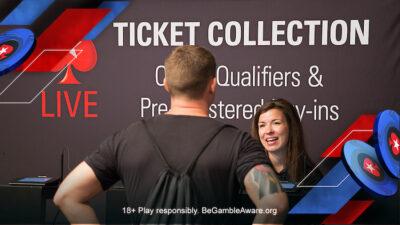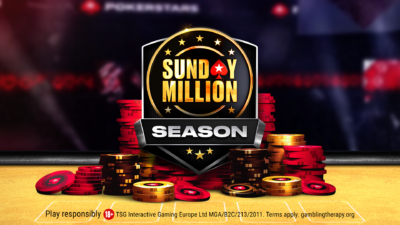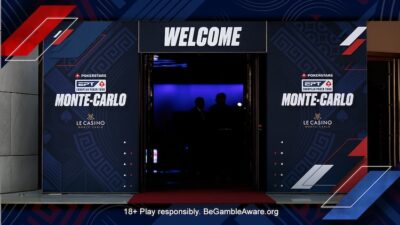Here at the PCA we’ve recently begun a tradition of having Question and Answer sessions with some of the PokerStars Team Pros (or other well-known poker players). We put out coffee and pastries in the player lounge, set the comfy sofas up front and throw questions at our guests. Then afterwards, the pros sign autographs and pose for selfies with the crowd – basically, it’s a ton of fun.
Anyway, at today’s Q&A session, we had PokerStars Team Pros Johnny Lodden, Theo Jorgensen, and Ville Wahlbeck talking about prop bets. As you’re probably aware, a “prop” (short for “proposition”) bet is simply any bet in which one person offers the other a bet on some coming event or the ability to do something. Examples:
• I’ll bet you $100 I can beat you in a 100-meter dash.
• I’ll bet you $100 the red bird will leave the feeder before the blue bird.
• I’ll bet you I can eat 20 hot dogs in an hour.
• I’ll bet you $100 that Dallas is the capital of Texas.
Theo Jorgensen had a wonderful and evocative way of describing the act of offering a prop bet – he refers to it as “Sticking his hand out”. That’s because that among most people, prop bets are always agreed upon with a simple handshake. So if I say “I can eat 20 hot dogs in an hour”, Theo would probably stick his hand out and say “$100?”
And that leads us to an interesting difference between the real world and the gambling world. People in the real world are often happy to debate future events (or even facts) ad nauseum; gamblers usually pull the conversation up short by offering a prop bet.
Ville Wahlbeck said it perfectly. He pointed out that when he’s with “real world” friends and acquaintances and somebody makes some kind of ridiculous statement, he simply says, “Well, let’s bet on that.” To use Theo’s language, he sticks his hand out.
I have occasionally found myself doing the same thing in non-gambling circles. I get very tired of trading “Yes it is”, “No it isn’t” with people. Look, one of us right (or is the most likely to be right in the future). At some point, it becomes clear that neither of us going to persuade the other, so let’s just put a bit of money down and get it settled.
As Ville said, when you “stick your hand out” in non-gambling circles, the other person usually backs down. In normal everyday life, we have an unfortunate habit of making statements without thinking carefully about them. The threat of being asked to put our money where our mouth is causes us to be more careful, more thoughtful.
You know how you’ll hear people say, “I’m 99% sure that Bishkek is the capital of Kyrgyzstan.” Well, that’s probably not accurate. Would you bet $90 against $5 that you’re correct? If you’re 99% sure, it would be silly not to take that bet (you’re a 99:1 favorite offering only 18:1 odds). But as Ville and Theo pointed out (and I see all the time), people make statements without clearly thinking through what they’re saying or the certainty with which they’re saying it.
In fact, this point was brought home with brutal accuracy during the American presidential election in 2012. Even on the evening of the election, many GOP pundits and major media outlets were saying that the election was a toss-up between Obama and Romney. But the data-driven watchers, the people who were tracking the numbers, said that Obama was a huge favorite.
Now, if you wished, you could have sat at your favorite watering hole and argued that it was a close race or it wasn’t. But many people chose to take the gambler’s approach to the race. Via various political betting platforms, they bet on either Obama or Romney, with various odds attached to those bets. Those who backed Romney, giving him odds as high as 40% or even 50%, got slaughtered.
Living in a world of gamblers forces you to think carefully about what you say, the claims you make, the facts you state.
Or you’ll have Theo Jorgensen sticking his hand out toward you.
Lee Jones the Head of Poker Communications at PokerStars; he first joined the company in 2003. He has been involved in the professional poker world since the mid 1980’s.
Back to Top






